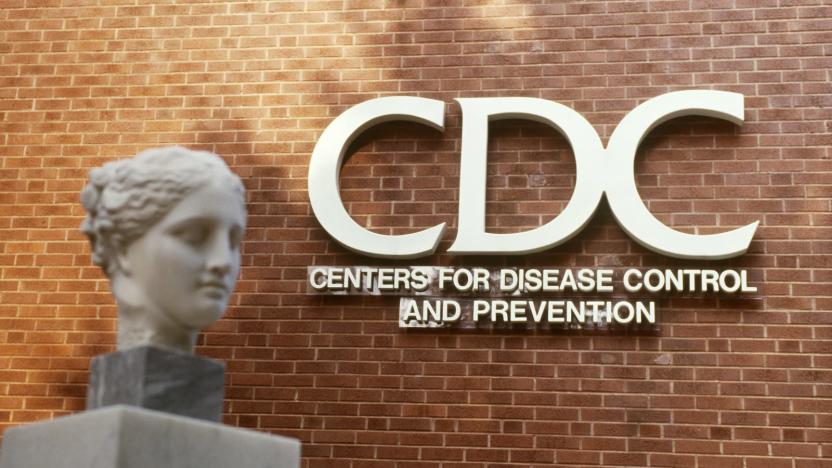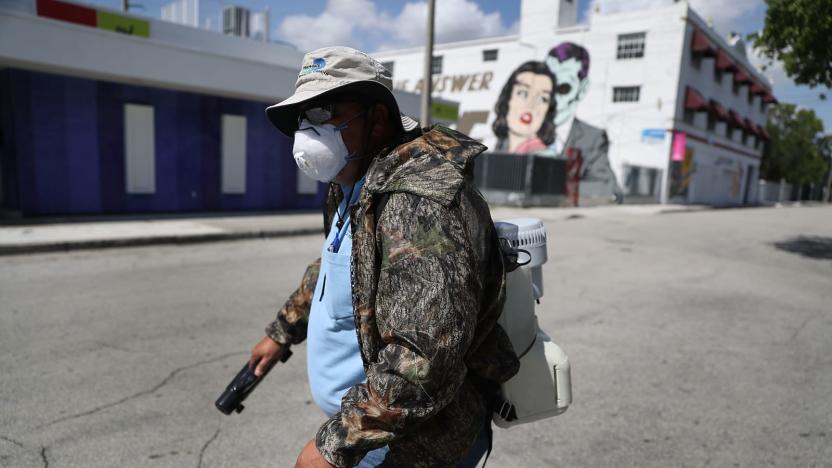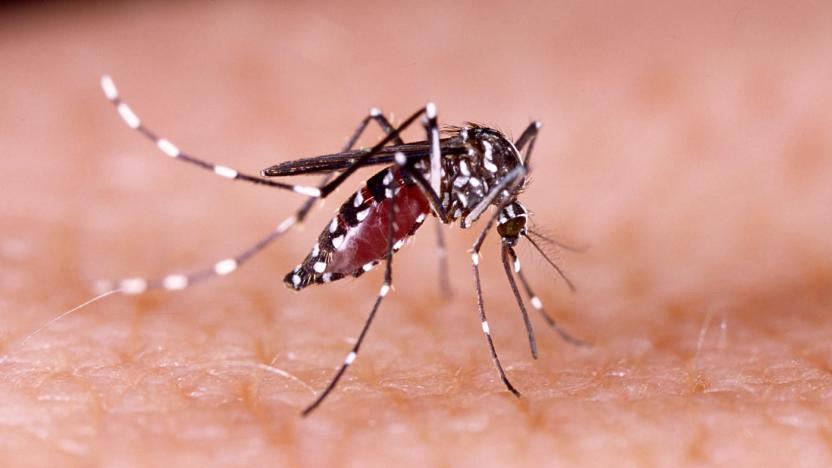CDC
Latest

The CDC is launching its first investigation into e-scooter injuries
The Centers for Disease Control and Prevention (CDC) is starting to take a look at accidents related to electric scooters, according to CNBC. The ongoing study, launched at the request of health and transportation officials in Austin, Texas, comes as increased scrutiny has been paid to the number of injuries that occur on these shareable devices. The CDC confirmed to Engadget that it is conducting the study.

CDC uses HP bioprinters to speed up testing for new antibiotics
The Center for Disease Control and Prevention is turning to some bleeding edge tech in its bid to stamp out drug-resistant 'superbug' bacteria. It's buying a slew of HP bioprinters (the D300e you see above) as part of a pilot program that could speed up the testing of more effective antibiotics. The machines will give regional labs in New York, Minnesota, Tennessee and Wisconsin their first shot at printing drug samples used for developing and running antimicrobial susceptibility tests. Hospitals won't have to wait for testing or else risk mistakes like overusing drugs.

CDC barred from using terms like 'science-based' in budget docs
We can just imagine CDC personnel still shaking their heads after finding out that they can't use certain terms in official documents for next year's budget. According to The Washington Post, the Trump administration has prohibited the CDC from using "vulnerable," "entitlement," "diversity," "transgender," "fetus," "evidence-based" and "science-based" -- terms you'd expect to be part of CDC's everyday vocabulary. The censorship comes almost a year after barring the EPA from sharing info with the public and having it remove all references to climate change on its website.

CDC warns against visiting a Zika-hit Miami neighborhood
Reports of the first active Zika transmissions in the US are leading to some far-reaching precautions in Miami. The Centers for Disease Control and Prevention are warning both pregnant women and their partners to steer clear of the city's Wynwood neighborhood (including The Shops at Midtown Miami) out of concern that they might be infected. The CDC is also asking future mothers to get Zika tests in their first or second trimesters if they've been in the area from June 15th onward, and to use condoms (or other barrier-based contraceptives) if they have sex.

Four people in Florida likely contracted Zika from US mosquitoes
Florida health officials warn there's a high likelihood that four cases of Zika in the state were transmitted by local mosquitoes carrying the disease, a first in the continental United States. The Florida Department of Health believes that active transmission of Zika, meaning direct mosquito-to-human infection, is occurring in a small area in Miami-Dade county, north of the downtown area (as shown above). Other Zika cases in the US have been the result of people traveling to regions where the disease is prevalent and then re-entering the country already infected.

CDC outlines how it'll cope with Zika outbreaks
The Centers for Disease Control and Prevention has published how it plans to tackle the Zika virus in the event of a domestic outbreak. While there are already cases of the virus in the US, these were contracted overseas and brought back by unwitting travelers. The agency believes, however, that certain breeds of mosquitos could spread the condition across the US, should they come into contact with a carrier. The plan outlines five stages of action, starting by simply monitoring mosquito patterns and controlling their populations as well as preparing emergency response teams.

The After Math: Buyer's remorse
You can't always get what you want, even if you pay good money for it. Disney has decided to drop its Infinity franchise and the studio that developed it. A judge ordered Lyft to double its class action payout to drivers. And Earth's atmosphere has doubled -- that's right, doubled -- in weight since we first got it. That's it, I want to talk to the manager.

CDC labs sanctioned for mishandling potential bioweapons
You'd think an agency like the Centers for Disease Control and Prevention would be extremely careful in handling potential bioweapons. But according to a report by USA Today, at least one CDC lab's permit was secretly suspended in recent years for "serious safety violations while working with bioterror pathogens." In addition, the agency has admitted to the publication that its labs had been sanctioned six times since 2003 for the same reason. Take note that the CDC helps run the Federal Select Agent Program, which oversees any work on anthrax, Ebola and other bioterror pathogens.

E-cigarette ads are encouraging teen vapers, CDC finds
Surprise! The US Centers for Disease Control and Prevention (CDC) has found a link between the popularity of vaping and e-cigarette advertising. In short, a greater exposure to vape-related ads increases the likelihood that a young person will pick up the habit. The findings are based on a questionnaire answered by 22,000 middle and high school students in the US. The responses were collected in 2014, so the situation might have evolved since then, but it shows a clear correlation between vaping and the volume of advertising found online, in print, on TV and in stores.

Millions of kids used e-cigarettes last year
Stephen Dorff is apparently more influential than we all thought -- if the youth of America even know who he is. Last year 3 million middle-schoolers and high-school students used e-cigarettes as their preferred method of tobacco delivery, according to a report by the Center for Disease Control. The CDC says that this carries over from 2014, where e-cigs were the most used tobacco product among those surveyed. In 2011, e-cigs represented 1.5 percent of overall tobacco use among that population and in 2015 the number skyrocketed to 16 percent. That's despite cigarette and cigar usage dropping during the same period. So yeah, kids really like battery-powered smokes.

CDC: Nearly half of American homes no longer have landlines
The Centers for Disease Control and Prevention (CDC) released a new survey Tuesday, showing that nearly half of all American households now use only cell phones rather than older landlines. In total, 47 percent of the 21,000 households queried were cell-only, 41 percent use both, just 8 percent use just a landline, and 3.4 percent have no phone at all. Accounting for demographics, the results are even more staggering -- 71 percent of 24-34 year-olds use only their cells. Additionally, renters were far more likely to not have landlines than landlords and people living with non-family members went cell-only 85 percent of the time.

Suicide hoax lands Facebook user in psychiatric institution
A user from California recently put Facebook's suicide prevention feature to test. According to a report, Shane Tusch shared his frustrations about his bank on the social network and posted a fake-threat to hang himself from the Golden Gate Bridge. A reader swiftly reported his post. As per the prevention service update last month, Facebook locked Tusch out of his account. He should have been in conversation with a crisis worker soon after, but instead he was arrested and placed in a psychiatric institution for a total of 70 hours.

This is a game about the realities of living with HIV
Hi, my name is Tim and I just learned I'm HIV positive. Not me personally, but, as the character Tim I played in I'm Positive, a short interactive narrative about living with the human immunodeficiency virus. It started out simply enough: I was shooting baskets when a phone call interrupted my jump shots. It was an ex girlfriend telling me that she'd been diagnosed as HIV positive after giving blood, and she urged me to get tested as soon as possible. Maybe it's because getting tested has been on my mind anyhow or possibly because I shared a name with the protagonist (there aren't any custom-name options; everyone plays as Tim), but after I "hung up" the phone I felt a weight in my chest and an all-too-real sense of panic.

New York City using Yelp reviews to track outbreaks of food poisoning
Remember when Yelp added hygiene inspection ratings to its restaurant reviews? Now, New York City is using the review service to work out which outlets are responsible for outbreaks of food poisoning. According to a study from the Center of Disease Control, researchers searched for words like "sick," "diarrhea" and "vomit" in reviews to look for any repeat offenders. Given that people don't normally report the odd case of "bad shrimp," these reviews are an easy way for authorities to stage interventions. This time out, for instance, the city was able to shut down three places that exhibited poor hygiene practices like poor sanitization, bare-hand contact with food and, best of all, live mice. Unfortunately, neither Yelp nor the City is revealing which businesses were found guilty, so we'd all best get scouring those reviews.

The Game Archaeologist: The PLATO MMOs, part 2
In our last installment looking at PLATO, the educational computer network that linked a thousand terminals across the US together, I don't think I stressed enough how awesome this system was for the time. In the 1970s, most universities had computers that required punch cards for input and spat back results on printers, grade schools simply didn't have computers, and if you wanted a PC at home, you'd have to build one from a kit that ended up being little more than a box with blinking lights. To sit down at a PLATO terminal was to jump forward a decade or more: sharp plasma displays, touch screens, speech synthesizers, email, message boards, and of course, the latest games. Often brewed up by students and programmers in their off hours, the PLATO games demonstrated the potential for online gaming, even if the games couldn't be put into every home. Last time we saw some of the innovations that would fuel MUDs and MMOs in years to come: networking, persistent characters, multiplayer matches with up to 32 people at a time, 3-D gaming in a virtual world, video game bosses, chat systems, and even crafting. So let's move on to the second batch of what I'm calling the "PLATO MMOs" -- not truly MMO as we know them today but uncanny pre-echoes of what the genre would become.

The Game Archaeologist: The PLATO MMOs, part 1
In tracing the history and pre-history of MMORPGs in this column, we've spent a lot of time outside of the 2000s and into the explosive '90s, the experimental '80s, and even the extraordinary '70s. Early pioneers like MUD1, Dungeons & Dragons, GameLine, bulletin board systems, Habitat, Island of Kesmai, and even Maze War have contributed to the development of these games we enjoy today. But I think we're going to outdo ourselves this week. We're going to go back further than ever before in the The Game Archaeologist time tunnel. When we arrive at our destination, we'll see that MMOs started germinating within a decade of computers being able to talk to each other. Ladies and gentlemen, I give you 1961.

CDC group to research impact of violent games on real gun violence
Following an executive order from President Barack Obama, the Centers for Disease Control tasked the Institute of Medicine and the National Research Council to create a plan to research the causes of – and potential deterrents to – gun violence in the United States. The committee created a plan that should produce results in three to five years and focuses on, in part, the impact of video games and other media on real-life gun violence. "While the vast majority of research on the effects of violence in media has focused on violence portrayed in television and movies, more recent research has expanded to include music, video games, social media, and the Internet – outlets that consume more and more of young people's days," the Institute of Medicine writes. "However, in more than 50 years of research, no study has focused on firearm violence as a specific outcome of violence in media. As a result, a direct relationship between violence in media and real-life firearm violence has not been established and will require additional research." In January, Obama signed 23 executive orders with the purpose of researching and curtailing gun violence, based on data collected by Vice President Joe Biden during a round of meetings with players in potentially related industries, including gaming.

Vice President Biden reiterates need to research violent video games
On January 16, President Obama asked Congress to approve a $500 million plan with the goal of suppressing gun violence, including measures to limit magazines for military-style assault weapons to 10 rounds, making universal background checks mandatory for gun buyers and adding resource officers to schools that want them. Obama asked for $10 million for the Centers for Disease Control and other agencies to research the causes of gun violence, specifying "research into the effects that violent video games have on young minds."On January 24, Vice President Joe Biden held a "Fireside Hangout" to field questions about the proposal, noting again that there was no relevant research into the effects of violent video games on human behavior."There is no hard data as to whether or not these excessively violent video games in fact cause people to engage in behavior that is antisocial, including using guns," Biden said. He mentioned a study from the American Academy of Pediatrics that concluded that children watching three to six hours of video games can lead to aggressive behavior – the study didn't extrapolate to violent behavior, however."So I recommended to the President that we do significant research," Biden said. "Let CDC, let the National Institute of Health, let these people go out and look at the pathology that's behind this, if there is a pathology related to gun violence. We shouldn't be afraid of the facts."

Obama orders CDC to study violence in video games
While violence in video games and the effect upon its participants wasn't at the crux of today's gun control press conference, President Obama did mention that he is sending the Center for Disease Control after the industry to root out a possible cause of gun violence. One of Obama's 23 executive orders was to "Issue a Presidential Memorandum directing the Centers for Disease Control to research the causes and prevention of gun violence." Among these potential causes are movies, television, and video games. The President defended the order by saying, "We don't benefit from ignorance. We don't benefit from not knowing the science of this epidemic of violence. Congress should fund research into the effects violent video games have on young minds." Vice President Joe Biden previously met with several video game industry leaders as part of the task force to make recommendations on the issue.

Lord of the Rings Online still not available in China
When it comes to mammoth western themepark MMOs and the Chinese gaming market, apparently there can be only one. And that one isn't named Lord of the Rings Online (or Highlander Online, sadly). CDC Corporation initially entered into an agreement to distribute Turbine's Tolkien-inspired MMORPG to Chinese gamers in 2006. Five years later, the game still has not seen the light of day, and Turbine has pulled the plug on the arrangement as a result. CDC spent approximately $10 million on "licensing, development, and other costs," but has nothing to show for the expenditures. Don't cry too hard for Turbine, though, as the Boston-based developer pocketed the $4 million non-refundable licensing fee.










